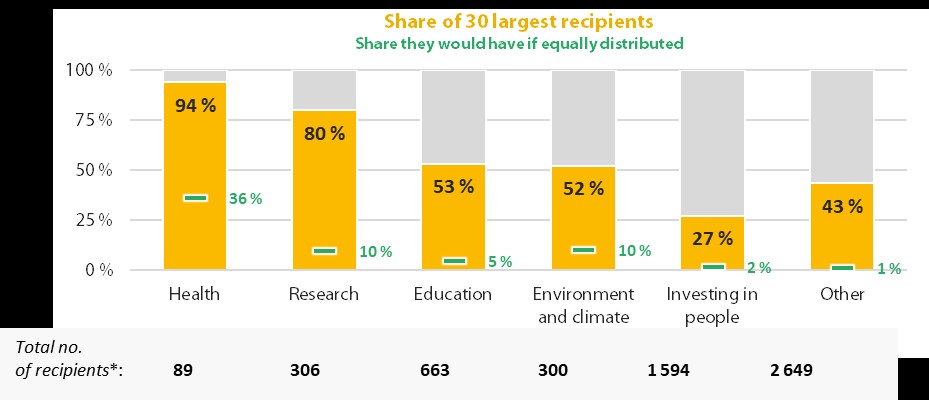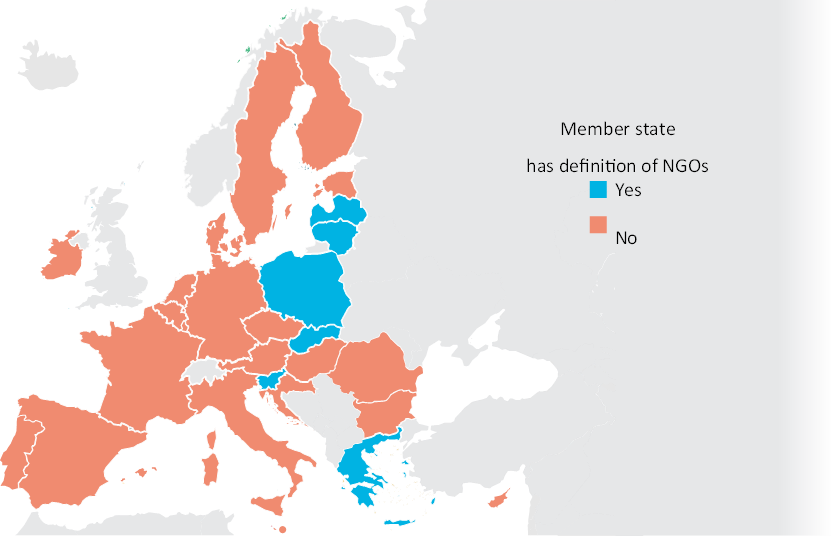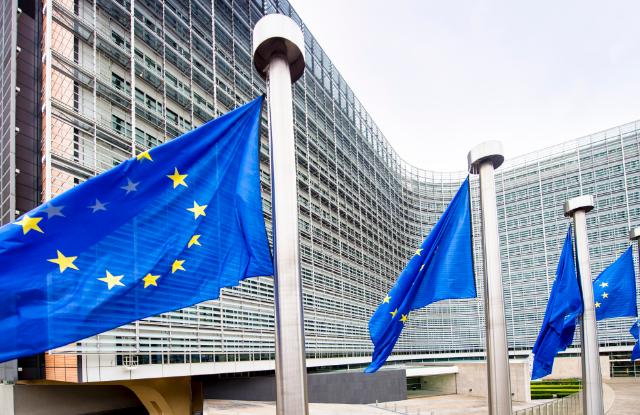EU funding granted to non-governmental organisations (NGOs) suffers from a lack of transparency, according to a new report by the European Court of Auditors (ECA).
The report comes against the backdrop of heightened public and political interest in EU funding for NGOs since the “Qatargate” scandal in 2022. In an audit in 2024, ECA found that the interinstitutional agreement on the EU Transparency Register included loopholes that leave scope for the institutions to apply it differently.
The Commission says that it does not want to increase administrative burdens on NGOs compared to other beneficiaries of EU funding.
The previous report aimed to assess whether the Transparency Register is an effective tool for ensuring transparency in lobbying activities related to EU policy and decision-making. The new audit focuses on the transparency of EU funding granted to NGOs.
“Transparency is key to ensuring credible participation by NGOs in EU policymaking,” said Laima Andrikienė, the Lithuanian ECA Member in charge of the new report. “However, despite some progress since our last audit, the picture of EU funding for NGOs remains hazy, as information on EU funding – including lobbying – is neither reliable nor transparent.”
Did ECA find evidence that NGOs used the funding to lobby the Commission, to lobby on behalf of EU Member States or to do the lobbying of the Commission?
“In our sample, we found grants that provide financial support to cover operating costs of an organisation pursuing an EU policy objective,” Laima Andrikienė told The Brussels Times. “In one case, we did come across some activities that included, for example, meetings with policy-makers or efforts to amend legislation, which could be seen as lobbying.”
“However, we have no evidence to say that the Commission contracted the NGO to lobby on their behalf,” she added. “It was the NGO itself which indicated the types of outreach activities they will carry out. While not legally required, we argued that due to the sensitivity of the advocacy activities, this could have been disclosed in a transparent way.”
In 2024, during the audit, the Commission issued a guidance note stating that “avoidance of any reputational risk should be one of the guiding principles when drafting proposals for EU grant award procedures”. Grant agreements should not require recipients to lobby EU institutions as a condition for EU financing. However, recipients are still free do it by their own choice.
In total, NGOs were awarded €7.4 billion in the EU’s key internal policies such as cohesion, research, migration and the environment between 2021 and 2023. €4.8 billion of the amount was granted by the Commission in direct and indirect management and €2.6 billion together with the Member States in shared management.
However, these figures should be taken with caution, as there is no reliable overview of EU money paid to NGOs, the auditors warn. The information is published in a fragmented way, which hampers transparency and restricts insight into the role of NGOs in EU policies.
Figure: A substantial portion of funding from the EU budget is directly granted to the largest NGOs by the Commission in each selected policy area

Source: ECA, based on financial data from the Commission’s accounting system
A main finding in the report is that a large part of EU funding granted to NGOs under direct management went to a small number of NGOs. Of over 4 400 NGOs, 30 received more than 40 % of total funds during the 2014-2023 period. Is there a list of them?
“We conducted our analysis based on the Commission’s internal accounting system,” Laima Andrikienė replied, “and cannot disclose the names of entities that weren’t included in the report and didn’t have an opportunity to respond.”
According to the Commission, it awarded €195.7 billion in grants under direct management to more than 100 000 entities between 2014 and 2023. Out of these, around 15 000 entities were beneficiaries that declared themselves as NGOs. These beneficiaries were awarded €22 billion or about 11% of the total.
Asked by The Brussels Times, the Commission extracted a list of the “top 20” NGOs from the Financial Transparency System. They accounted for €7 billion or about 32% of all EU funded grants directly managed by the Commission to NGOs across this time period. If calculated as a proportion of the total of EU funding awarded in grants under direct management the figure is reduced to 3.6%.
The list is dominated by research organisations and international aid and humanitarian organisations, with the German Max Planck Society for the Advancement of Science (€1,1 billion) and the Norwegian Refugee Council (€0,8 billion) at the top. According to the Commission, the grants were awarded following open and competitive procedures and based on pre-defined evaluation criteria.
In addition to being a non-profit organisation, an NGO must be independent from government. However, in their calls for proposals to award grants, the Commission departments defined criteria for NGOs differently. As a result, an organisation considered to be an NGO by one department may be excluded in another competition by another department.
In 2024, the Financial Regulation was modified and a definition of NGOs was introduced that now must be applied by the Commission. However, the definition did not consider the controlling participation by governments in NGO governance bodies.
Furthermore, the definition of what an NGO is varies in the EU Member States and is rarely enshrined in national legislation. Only a quarter of EU Member States reported have legal definitions of an NGO in their national legislation, albeit often with a different scope, according to ECA.
The organisations considered to be NGOs by the EU may not always be NGOs in their member states. Although the Commission checks the main aspects of the NGO definition, these checks are not complete and based on self-declarations.
ECA found that more than 90 % of entities to which payments were made in the accounting system in the 2021-2023 period were not even categorised as an NGO or non-NGO, as this field was left blank. After the amendment of the Financial Regulation, applicant to grants under spending programmes directly managed by the Commission are obliged to indicate whether they are NGOs.
In its reply to the audit report, the Commission wrote that it cannot impose the new NGO definition in the Financial Regulation on the Member States and the evidence from them about their status is still based on self-declarations.
Figure: Only a few member states have their own legal NGO definitions

Source: ECA, based on replies to the questionnaires we sent to the managing authorities
Why cannot the Commission require that NGOs applying for funding should provide proof that they are registered as NGOs according to a definition that is consistent with the updated EU definition?
"The NGO definition is applicable to the EU budget, direct management,” a Commission spokesperson replied. “This is not an EU-wide definition, and of course some member states have their own definitions at national level, but these two definitions apply in different contexts."
“If we were to introduce additional burden specifically for NGOs, that would give the impression they are in a category on their own...we don't think that NGOs at this time should be subject to additional requirements.” Only as of 2029, will the Financial Transparency System be extended to shared management."
“Cutting down administrative burden is an important priority for this Commission,” he added. “At this point in time, there is no reason to assume that NGOs would have to be subject to mores burdens than other beneficiaries."
How common is it that the NGOs are not genuine civil society organisations but related to the government in some way or another?
“We refer to three entities that are classified in the Commission’s system as NGOs despite their dependence on government,” the ECA team replied. “Considering our direct management sample comprises 30 entities, this points to a systemic weakness.”
Did you find examples that EU funded NGOs do not respect EU values, such as the rule of law and human rights?
“We took a closer look at 90 recipients, randomly selected from from a pool of around 12,000 recipients who received EU funding under different EU programmes and managed under management modes, the team replied. “In the end, we didn’t find a single case of non-compliance with EU values."
“However, the total number of NGOs across the EU is estimated to be in the hundreds of thousands, if not millions. That said, it’s really important to have proactive checks, given the potential reputational damage that even one or two cases of non-compliance with EU values could cause to the EU.”
Mixed reactions
The European Commission welcomed the audit report and highlighted the acknowledgment by ECA that it has taken some steps in enhancing transparency regarding EU funding. “The Commission is fully committed to ensuring that every euro from the EU budget is well spent, in line with the rules and for the benefit of EU citizens.”
The Commission also wrote that it will consider the audit recommendations to the fullest possible extent to enhance transparency and accountability – but always in line with the ongoing simplification system proposed in the Political Guidelines of the Commission President.
In its formal reply, the Commission stated that some of the recommendations were only partially accepted. It emphasised that the participation in EU award procedures is not dependent on fulfilling the NGO status in the majority of EU award procedures. In shared management, the Commission does not have the competence to align the NGOs definitions which are subject to national laws.
"The systemic opacity revealed by ECA is yet another indication of how power and resources are monopolised by a few favored players, all while the general public remains kept in the dark,” commented Frank Furedi, Executive Director of the conservative think tank MCC Brussels.
“The report shows that the EU's supposed commitment to transparency and accountability is nothing more than a façade,” he summarized.
Just before the publication of the audit report, the think tank organized a seminar, with the Patriots for Europe Political Group, on EU funding to NGOs, claiming that the EU spends enormous sums on funding NGOs for the most radical ideologies. The audit findings can be described as damning but fuel also conspiracy theories inspired by the Trump administration’s ban on public funding for diversity, gender equality and human rights.
M. Apelblat
The Brussels Times

